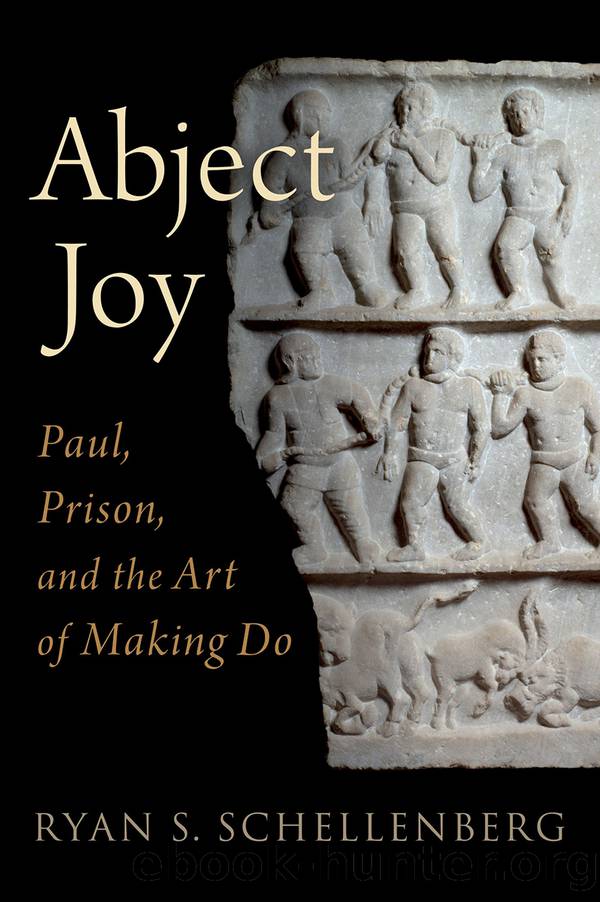Abject Joy by Ryan S. Schellenberg

Author:Ryan S. Schellenberg
Language: eng
Format: epub
Publisher: Oxford University Press
Published: 2021-08-15T00:00:00+00:00
Philosophers, Astrologers, and Other Divine Heralds
Others rejected the moral authority of the magistrate more explicitly. âWho will judge between me and the emperor,â Philostratus has Apollonius of Tyana ask on his way from the prison to Domitianâs courtroom, âfor I will show him to be wronging philosophy?â (Vit. Apoll. 8.2.1). For a proudly independent sage like Apollonius, there was no verdict weightier than truth, and truth could be accessed not by dominion but only by philosophy (cf. Epictetus, Diatr. 3.7.31â36). From this perspective, although he may look like a fearful and sovereign judge, the emperor was in fact just another potential student, a man whose elevated position left him particularly in need of the sageâs moderating counsel (7.36.4; cf. Musonius Rufus, Diatr. 8). Certainly he did not merit the awe he usually inspired (cf. 7.22.3). And so, although he could easily have fled, and was endowed too with the power to slip free of his chains, Apollonius entrusted himself to his divinely ordained fate and faced his imprisonment and trial with equanimity.82 Prison, it seems, bothered him not at all (7.28, 36). Nor did his accuserâs schemes. When an informer slipped into the jail hoping to catch him in a compromising comment, Apollonius saw through the ruse immediately: âIf Iâm going to criticize the emperor, Iâll speak to him directly,â he retorted, vaunting his unflinching directness of speech (7.27). And when, later, he stands before Domitian, this is exactly what he does (7.33).83
In Philostratusâs tale, prison figures above all as the instrument of the tyrant, his desperate but ultimately futile attempt to silence the truth of the unsubmissive philosopher. It was not only Apollonius. Apt to mistake the philosopherâs cloak (á½ ÏÏίβÏν) for the getup of the diviner (á½¡Ï Î¼Î±Î½Ïικá¿Ï ÏÏá¿Î¼Î±)âa common source of confusion, as we will seeâNero imprisoned Musonius Rufus for the sole crime of wisdom (4.35). If the teaching of his student Epictetus is any indication, Musonius would have seen his imprisonment as an uncomfortable but not completely unwelcome way to demonstrate his philosophical mettle. As Epictetus insists, âA judgeâs dais and a prison is each a place, the one lofty, the other lowly [βá¿Î¼Î± καὶ ÏÏ Î»Î±Îºá½´ ÏÏÏÎ¿Ï á¼ÏÏὶν á¼ÎºÎ¬ÏεÏον, ὠμὲν á½ÏηλÏÏ, ὠδὲ ÏαÏεινÏÏ]; but the orientation of your will can be kept the same, if you want to keep it the same, in each. And then we will be rivals of Socrates, when we can write paeans in prisonâ (Diatr. 2.6.25). Attempting to buoy up his deflated fellow prisoners, Apollonius too speaks of rivaling the resolute sufferers of lore: âWhen we ponder the many wise and blessed men whom vicious mobs have bound and tyrants have trampled, let us also accept these things, lest we be left behindâ (7.26.6; cf. Heb 12:1â13).
Philostratusâs narrative brings two wise and blessed prisoners in particular to mind, Dionysus and Socrates. âTell me what I must suffer,â the disguised Dionysus had demanded of the archetypal god-fighting despot Pentheus in Euripidesâs Bacchae. âWhat fearful thing will you do to me?â (492).
Download
This site does not store any files on its server. We only index and link to content provided by other sites. Please contact the content providers to delete copyright contents if any and email us, we'll remove relevant links or contents immediately.
american english file 1 student book 3rd edition by Unknown(616)
Phoenicians among Others: Why Migrants Mattered in the Ancient Mediterranean by Denise Demetriou(612)
Verus Israel: Study of the Relations Between Christians and Jews in the Roman Empire, AD 135-425 by Marcel Simon(595)
Caesar Rules: The Emperor in the Changing Roman World (c. 50 BC â AD 565) by Olivier Hekster(582)
Basic japanese A grammar and workbook by Unknown(580)
Europe, Strategy and Armed Forces by Sven Biscop Jo Coelmont(523)
Give Me Liberty, Seventh Edition by Foner Eric & DuVal Kathleen & McGirr Lisa(500)
Banned in the U.S.A. : A Reference Guide to Book Censorship in Schools and Public Libraries by Herbert N. Foerstel(492)
The Roman World 44 BC-AD 180 by Martin Goodman(479)
Reading Colonial Japan by Mason Michele;Lee Helen;(471)
DS001-THE MAN OF BRONZE by J.R.A(467)
Introducing Christian Ethics by Samuel Wells and Ben Quash with Rebekah Eklund(464)
The Dangerous Life and Ideas of Diogenes the Cynic by Jean-Manuel Roubineau(458)
Imperial Rome AD 193 - 284 by Ando Clifford(457)
The Oxford History of World War II by Richard Overy(456)
Catiline by Henrik Ibsen--Delphi Classics (Illustrated) by Henrik Ibsen(441)
Language Hacking Mandarin by Benny Lewis & Dr. Licheng Gu(413)
Literary Mathematics by Michael Gavin;(409)
Brand by Henrik Ibsen--Delphi Classics (Illustrated) by Henrik Ibsen(399)
